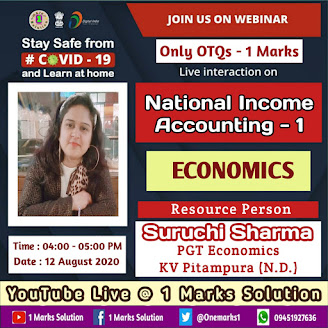*DAY #21
16.04.2020*
*TOPIC – RBI AS A
CONTROLLER OF CREDIT*
Central bank or
RBI plays an important role during the times of economic fluctuations. It
influences the money supply through:
1.
Quantitative instruments:
Bank Rate;
Repo Rate;
Reverse Repo Rate;
Legal Reserve ratios;
Cash reserve Ratio;
Statutory Liquidity ratio; and
Open Market Operations;
2.
Qualitative instruments:
Moral Suasion;
Credit Rationing;
Direct Action; and
Margin Requirement.
Now we will discuss in detail about how Central Bank (RBI) is using these
instruments to control credit in an economy (India).
QUANTITATIVE
INSTRUMENTS
1. BANK RATE POLICY -
It refers to the rate at which the central bank lends money to commercial banks
as a lender of the last resort for long term requirements.
Central Bank increases the bank rate
during inflation (excess demand) and reduces the same in times of deflation
(deficient demand).
2. REPO RATE POLICY -
It refers to the rate at which the central bank lends money to commercial banks
as a lender of the last resort for short term requirements.
Central Bank increases the Repo rate
during inflation (excess demand) and reduces the same in times of deflation
(deficient demand).
3. REVERSE REPO RATE –
It
is the rate at which RBI borrows money from the commercial banks or RBI accepts
excess deposits of commercial banks.
Central Bank increases the Reverse Repo rate
during inflation (excess money supplies exist in an economy) and reduces the
same in times of deflation (excess money supplies exist in an economy).
4. LEGAL RESERVE RATIO
-
LRR (Legal Reserve Ratio) refers to that legal minimum
fraction of deposits which the banks are mandate to keep as cash with themselves. The LRR is
fixed by the Central Bank. It has two components: Cash Reserve Ratio and Statutory
Liquidity Ratio.
(i) Cash Reserve Ratio (CRR) -
It
refers to the minimum percentage of net demand and time liabilities to be kept
by commercial banks with central bank.
(ii) Statutory Liquidity Ratio (SLR) -
It
refers to minimum percentage of net demand and time liabilities which
commercial banks required to maintain with themselves in the form of specified liquid assets including cash, gold and govt.
securities.
R.B.I. can influence the credit creation
power of commercial banks by making changes in CRR and SLR. Reserve Bank
increases CRR during inflation to reduce credit and decreases the same during
deflation to increase credit. SLR is also increased during inflation to reduce
credit and decreased during deflation to increase credit.
6. OPEN MARKET OPERATIONS -
It
refers to the buying and selling of securities by the Central Bank from/ to the
public and commercial banks. It sells government securities during inflation to
control credit and buys the securities during deflation to increase money
supply and credit in economy.
MONETARY
POLICY ( ADOPTED BY RBI )
|
||
QUANTITATIVE
MEASUREMENTS
Inflation Deflation
|
||
Increase
|
BANK RATE
|
Decrease
|
Increase
|
REPO RATE
|
Decrease
|
Increase
|
REVERSE RAPO RATE
|
Decrease
|
Increase
|
CASH RESERVE RATIO
|
Decrease
|
Increase
|
S. L. R.
|
Decrease
|
Sell
of Securities
|
OPEN MARKET OPERATION
|
Purchase
of Securities
|
QUALITATIVE
INSTRUMENTS
1. MARGIN REQUIREMENTS -
It
is the difference between the amount of loan and market value of the security
offered by the borrower against the loan. Margin requirements are increased
during inflation to restrict credit and decreased during deflation to encourage
credit.
2. MORAL SUASION -
It
is a combination of persuasion and pressure that Central Bank applies on other
banks in order to get them act in a manner in line with its policy.
3. SELECTIVE CREDIT CONTROLS -
central
bank gives direction to other banks to give or not to give credit for certain
purposes to particular sectors.
4.
DIRECT ACTION - Central
Bank can take direct action against the banks who are not following the circulars
and instructions given by the RBI. Under this tool RBI can stop functioning as
banker’s bank i.e. lender of last resort, clearing house function, accepting
deposits etc.
QUIZ
LINK
VIDEO
LINK
TOPIC
– RBI as Controller of Credit
Please
like, Share Subscribe and download app from play store by link given in
description.
https://play.google.com/store/apps/details?id=com.theappsstation.android5c3989dd91d21
Regards
Dr.
Asad Ahmad
KV
IIM, Lucknow
##pls
share other educational / official school group, so that more students will get
benefit. Thanks a lot.
To
get link text on
08770981320/
09451927636
Facebook
page - https://m.facebook.com/madeeconomicseasy/?ref=bookmarks
Blog
- http://drahmadasad.blogspot.com/?m=1
eco.lecturer1984@gmail.com




No comments:
Post a Comment